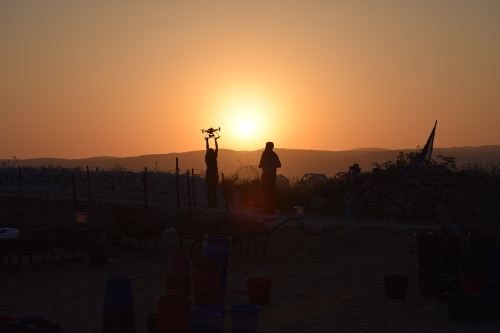How does one become an archaeologist? This is the inevitable question looming right after the one about finds or dinosaurs or any myriad major movie franchise reference that non-archaeologists have for those of us who admit to actually being archaeologists. It’s also the question that is most difficult to answer because, for many, archaeology is not a natural path. Not necessarily even a logical path. Most archaeologists will answer that they found their path by one stroke of luck or another, be it in a bar in Jerusalem or through the educational system in their respective country or by knowing someone who did it and thought it was cool, tried it and stuck with it.
There is, however, a much more perplexing question out there. How do you stay an archaeologist? The answers to this question occupy a much smaller space. Archaeologists who stay archaeologists generally belong to one of three camps: professors and educators, professional archaeologists who work for public organizations or private companies and those on the fringe. Those on the fringe are the shovel bums traveling from dig to dig gaining experience before getting their Masters degrees, those who travel from dig to dig because that is what they choose to do for a living, and those who have picked up a skill that archaeologists find necessary and have been incorporated into the fold.
My story is that of being incorporated into the fold. I’ll admit, I didn’t plan it this way. Again – my story is just the same as any other archaeologist. I struggled to find my footing in undergrad until a friend suggested I take an anthropology class in the class I discovered that there were people who were, in fact, actual archaeologists and that it was possible to become one. That was it – I went on my field school the following summer and immediately all of my decisions were made with the singular intention of becoming an archaeologist. I was lucky – I landed a job with the BLM in the Four Corners, and worked on lands abutting Mesa Verde for four summers. During that time is where my story diverges from most archaeologist success stories and moves to the fringe. My mentor and supervisor sat with me and explained that our GIS Specialist was leaving the following season, and on my return he would like me to train and fill her role. She trained me in two weeks and returned to grad school to complete her Masters. I stayed, filled with awe over what I considered then and still consider a vast, exciting and ever expanding alternate universe of geographic information systems or GIS.
GIS is a near perfect solution for archaeologists. The most important part about archaeology, the meat, the one thing that separates archaeologists from pot hunters and collectors is that we record what we find and analyze these recordings for patterns to gain insight into how people before us lived and why they made the decisions they made. GIS allows archaeologists to record where something was found, what was found there when, see every recording in context, create hypothesis or draw conclusions and then share all of it they want with students, educators and the public. What a powerful tool!
In addition to GIS becoming an avid interest of mine on its own, through GIS I was able to find a way to stay an archaeologist. While archaeology has not always been my profession, it has informed how I approach the world of GIS for good and I continue to find the archaeological world to be a source of sustenance for my imagination and inspiration for continued growth. As our understanding of the world as archaeologists becomes more intertwined with our understanding of the world through technology, GIS will continue to expand within the archaeological community. I can’t wait to help educators see sites as they would have looked at their peak with the help of augmented reality. I can’t wait to help professional archaeologists’ lives easier as high accuracy field data collection applications become more accessible. But above all of that, I can’t wait to see what innovation and creativity those on the fringe of archaeology will bring to the field.

No Comments